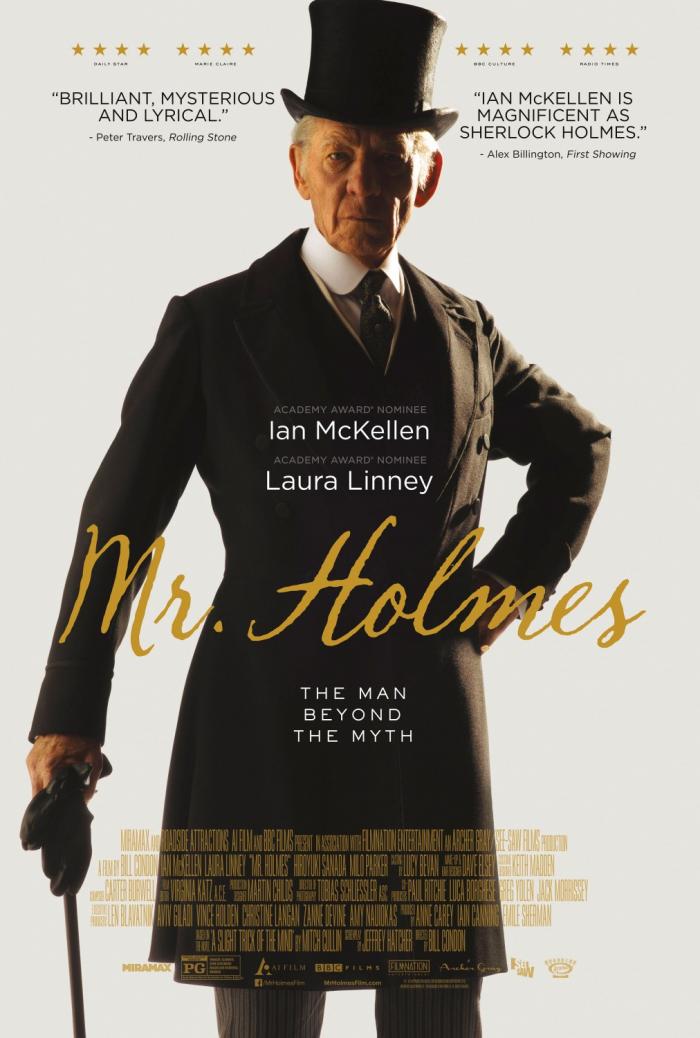Strong Performances Can't Save MR. HOLMES From A Case Of Mediocrity
FTC Statement: Reviewers are frequently provided by the publisher/production company with a copy of the material being reviewed.The opinions published are solely those of the respective reviewers and may not reflect the opinions of CriticalBlast.com or its management.
As an Amazon Associate, we earn from qualifying purchases. (This is a legal requirement, as apparently some sites advertise for Amazon for free. Yes, that's sarcasm.)

Respected director Bill Condon and beloved actor Sir Ian McKellan have a history of success, having worked together previously on GODS AND MONSTERS. So when Condon reached out to his friend about playing Sherlock Holmes late in life, struggling to put the pieces of his unsolved final case to rest before his faculties leave him unable to do so, McKellan jumped at the chance. After all, who wouldn’t want to play Sherlock Holmes? After all, so many other English luminaries have done it: Basil Rathbone, Peter Cushing, Christopher Lee, Michael Caine, Christopher Plummer, and, currently on BBC television, Benedict Cumberbatch.
In MR. HOLMES, McKellan plays the famous detective as a less self-absorbed elder, still highly observant but prone to forgetting names, and that’s getting worse. Having retired to the country and attended by a housekeeper named Mrs. Munro (the always excellent Laura Linney) and her son Roger (future star Milo Parker), Holmes tends his bee hives and becomes Roger’s mentor, teaching him the ways of bees and detective work while Roger’s insatiable curiosity pushes Holmes to seek closure to his final case before his memory gets too far gone. McKellan as Holmes is warmer than I’d expected, the good detective having most often been depicted as rather aloof. There is no Watson here, as he’d married and moved years before. Holmes does mention his former partner from time to time, gently admonishing him for the liberties he’d taken in recounting Holmes in Watson’s stories. Holmes, we discover, never wore a deerstalker cap and preferred a cigar over a pipe. Their office was actually across the street from 221B Baker Street to avoid the crowds of tourists and onlookers and to scout for trouble rather than invite it directly. These touches take away some of the glamour from the detective, and reveal him to be at least a bit more of the common sort.
While the relationship between Roger and Holmes is often touching and at times outright funny, the case of Thomas and Ann Kelmot (Patrick Kennedy and Hattie Morahan) seems to be not much of a case at all. Through his somewhat fuzzy recollections, we learn that Thomas hired him to see if his wife was still faithful after the loss of their children during pregnancy (two miscarriages) had caused her to become withdrawn, spending all of her time in seclusion. That’s a case any cheap private detective would take, surely beneath a man of Holmes’ standing. Thomas would have been better served hiring a marriage councilor. Holmes seemed to still have some rather uncharacteristic fondness for Mrs. Kelmot, though it serves no purpose. Neither does another subplot surrounding Holmes taking a trip to Japan to look for a specific plant growing in the ashes of Hiroshima after WWII. The plant, Holmes believed, would have pharmaceutical value in staving off his memory loss, but again nothing really comes of it.
That’s the pity of this picture. It could have been called MR. SMYTHE and just focused on the relationship between an elder gentleman and his young friend, or on how the curiosity of youth helped an old man keep his wits about him a little longer. The trappings of Sir Arthur Conan Doyle’s famous character is really all just window dressing, too often getting in the way of the more interesting interplay between a venerated veteran thespian and a young actor who acquits himself tremendously well in their shared scenes. As a character study, that would have been enough to hold my interest. In the end, I can barely recollect much of the “mystery” or the trip to Japan, and found myself wishing for still more illumination of the dynamic between the old man and the young boy.
American audiences expecting the action of the Guy Ritchie/Robert Downey Jr. version or the sleuthing of the classic renditions won’t find a great deal to satisfy either craving. Fans of art house character studies will likely wish, as I did, that it eschewed the celebrity in favor of the mundane. I think MR. HOLMES would have actually been far more interesting for it.


